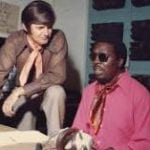Jesse Dayton and the vicissitudes of stardom: a mystery
In the late 1990s I would have bet something in the low three figures that Jesse Dayton would some day adorn the cover of our little magazine. Now, I recognize that theoretically I was in a position to fix that bet, but, as a practical matter, Peter and I did not force our opinions on each other. (Though we did use certain kinds of crowbars, gently.)
Today, as I put my hands on CDs and made a few hours to winnow them down, thankful that the smaller house we are building continues to be delayed, and so I can put off this sordid chore, I chanced upon a fistful of Jesse’s albums. (Now you know how far I got, and why it never gets done.)
Including two different working versions of his sophomore release, Hey Nashvegas!, which finally appeared in 2001.
He seemed a three-tool player: tall and handsome and winning with his female audience; well-voiced, and adept with his guitar; and an able writer. He seemed to have the magic of stardom, that thing I saw or heard early with Ryan Adams, with Kurdt Cobain, with Lucinda Williams (even though I suppose I was comparatively late to that discovery), one or two others.
I write this while reading (in between three other books) Rick Bass’s curious, contemplative fictional biography of the Browns, Nashville Chrome. And I am seduced by his conception of unseen magical forces lurking behind and within music, as I am often seduced by the notion of magic (see: Tom Robbins). And so it is through that filter I think of Jesse Dayton.
I know that things happen. Life happens. I know that he was signed to Justice at more or less the same time that label’s roster included Billy Joe Shaver, Waylon Jennings, and Willie Nelson. And yet I know, too, that time and thought and expense went into that second record, because Justice believed in young Mr. Dayton. Nashvegas! finally came out on a joint imprint, Stag/Justice, reflecting, if memory serves, his move to a label invented by his manager, who had worked at Justice. And I apologize in advance should that prove inaccurate.
It shouldn’t have mattered. He made more records, after. And yet…and yet I suspect many reading this hasty assemblage of words have no memory of Jesse Dayton, or only the barest hint of a trace of remembering. Unless you live in Texas, where he presumably still plays. (I know, I could look for his website. The truth of his present career is not of interest to me tonight, though I’m sure it’s of great interest to him.)
Maybe I misjudged his gifts. Maybe the industry screwed him over. Maybe he sabotaged his own career, as some artists seem obliged to do. Maybe he found happiness off the stage, and gave up the quest. But I was not alone in my supposition of his coming greatness. I remember, for example, the enthusiasm of our photographer David Wilds, still then living in far-away Portland, Oregon, when he first saw Jesse on stage.
He had that thing, Jesse did. Maybe it left. Maybe he wasted it. Maybe the industry chewed it up. Maybe he had less than I thought, less than he needed.
I don’t know.
Life is filled with caprice. That, for the moment, is the best lesson I can glean.
And now back to the cabinets, and the winnowing.




